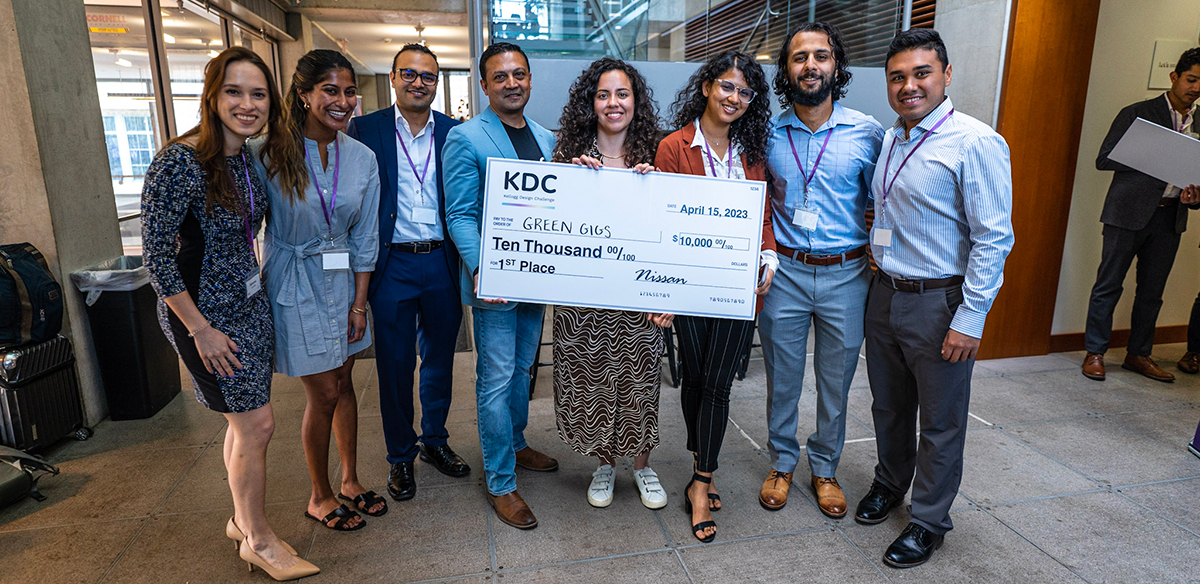The Automobile as an Office
A trio of MBAi students won top honors in the Kellogg Design Challenge by rethinking how an auto manufacturer can move more gig workers to electric vehicles.

A car isn’t designed to be an office, but a group of students in Northwestern's MBAi Program recently found success making them friendlier to gig workers.
MBAi is a joint-degree program between Northwestern Engineering and the Kellogg School of Management that brings artificial intelligence into the traditional MBA lessons. Vasudha Khare (MBAi '23), Erika Ortiz (MBAi '23), and Kareem Younis (MBAi '23) partnered with three students from Northwestern Engineering and Kellogg to compete in the Kellogg Design Challenge (KDC), the world's largest business design case competition for MBA programs.
The team walked away with the first-place prize and a promising concept to make electric vehicles (EVs) more accessible and user-friendly to gig workers who drive for companies such as DoorDash and Uber.
The key to the victory?
“Our focus was on designing not just product features but also a new business model,” Khare said. “We focused our efforts on improving car designs, such as better storage for food, easy cleaning in case of spillage, or lower back and neck support for long driving hours, but we also proposed a new non-ownership, low-cost rental model for gig workers to drive these EVs.”
The KDC competition, now in its fourth year, is designed to engage a community of future business leaders in partnership with a sponsoring company to produce actionable insights for a complex challenge that calls for top-tier, human-centered design and business skills.
This year’s challenge was sponsored by Nissan and centered on helping the auto manufacturer reimagine the world’s transportation system to better meet global needs.
Those needs are real and growing. The team’s research uncovered Uber and Lyft’s goal of having net-zero emissions by 2030. That will require a huge investment in EVs, all aimed at reducing the companies’ impact on climate change.
The challenge is further intensified by the rise in the number of gig workers, which tripled from 2017 to 2021, according to tax data.
Ortiz and her teammates said part of the reason their project was so successful was because of its intense focus on the end user. Team members interviewed hundreds of gig workers to hear first-hand accounts of their struggles with finding a more climate-friendly option for their work, as well as their wants and needs for a vehicle more suited to the job.
“By identifying the high cost of owning a vehicle, especially an electric one, as a major pain point, we were able to find innovative solutions that addressed this issue,” Ortiz said. “It highlighted the importance of user-centered design and the potential for innovation within mature industries.” From the interviews, the team created a customer persona – the targeted user for their service concept.
Having that specific user persona was critical for allowing the team to craft a compelling narrative for its presentation to judges, Younis said. With that persona, the team was able to show how their solution alleviated gig workers’ pain points.
Khare said lessons learned from MBAi coursework played a major role in helping the team find success.
“Technical Product Management literally walked us through personal definition and customer problem identification,” he said. “Lessons from MBAi Marketing were instrumental in defining target customer needs and keeping the scope narrow. Applied AI helped us think through automation in design features for our car.”
Team members said competing in the challenge was a worthwhile venture — one that was enhanced because they were able to collaborate with one another.
“The MBAi cohort is awesome,” Khare said. “It’s always the best place to start if you want to build a great team to do something meaningful.”
